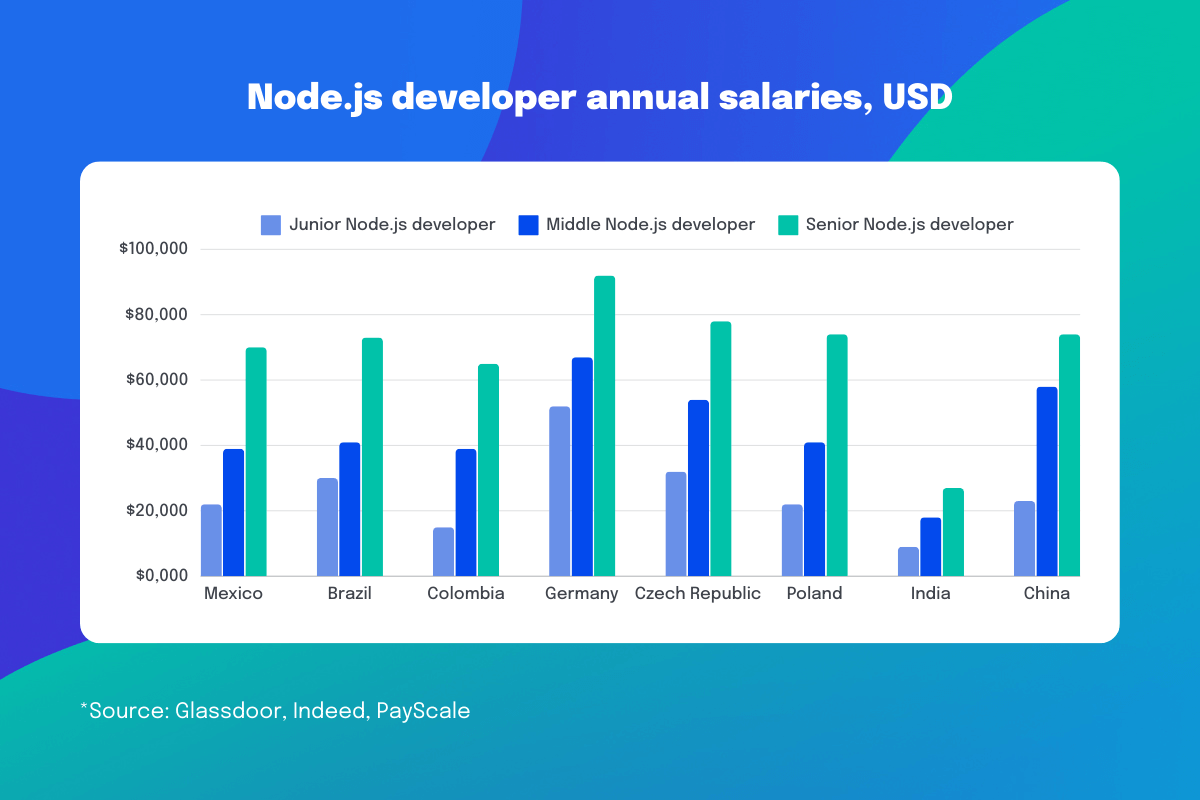For more than a decade now, people have gradually appreciated the benefits of remote work. Now, more and more candidates are looking for job opportunities that include remote work options. According to recent Owl Labs research, due to those rapid changes, businesses must make work portable.
Thus, if you need to hire a Node.js developer for your business, now is a great time to look at the global pool of talent. On the flip side, since writing Node.js command-line tools on JavaScript codes has become popular, hiring a top-tier Node.js engineer has become challenging.
For this reason, we have created a comprehensive guide to examine the best options for hiring a web developer nowadays. This article will explore how Node.js popularity affects your hiring process, the average salaries of Node.js development services, and the different engagement types. By the end of this 14-minute read, you will have everything you need to hire a Node.js specialist.
Table of Contents
Node.js popularity: does it influence your hiring process?
As mentioned above, Node.js has become well-known as one of the best ways to execute JavaScript code outside a web browser. Likewise, software engineers also use this open-source, high-performing, cross-platform, back-end runtime environment daily in countless projects worldwide. According to Hackerank, JavaScript has been the best-known programming language since 2019 and will continue to be so in 2024.
Accordingly, Node.js programmers have gained extreme popularity as most companies use this runtime to back up their JavaScript code. Numerous giant platforms, like Netflix, Trello, LinkedIn, and eBay, use Node.js for building their primary and mobile apps.
Therefore, the demand for Node.js engineers is enormous, and hiring a professional developer has become more challenging than ever. To hire an expert Node.js developer with decent experience and good English, you should be ready to pay, on average, from $7K to $11K monthly, depending on the hiring model.
| In-house hiring in the US | Staff augmentation via YouTeam | Freelance contractor on Upwork | |
| Average monthly payment to Senior Node.js Developer | $14,345 | $9,540 | $7,800 |
| Extra costs for the company | Taxes, bonuses, non-financial benefits, office rent, and support | YouTeam commission | Upwork commission |
| Hiring costs | HR costs, job promotional ads | YouTeam does candidates’ sourcing and assists with interviews | Managers’ time for candidate sourcing, screening, and interviewing |
Sources: Glassdoor, YouTeam, Upwork
Before we dive deeper into the benefits of different engagement types, let’s have a look at the Node.js developers’ average income worldwide.
How can knowledge of the average Node.js developers’ salaries help your business?
Average salary rates won’t give you an exact answer on your future development spending. There are too many other variables that can influence the final price.
For example, when you hire a developer in-house, you should also add all extra costs associated with a new employee. Development rates from outsourcing companies would be higher than the average salary because they already include all these extra costs like taxes, office supplies, etc.
If you need extraordinary talent, their salaries will also be higher than the average. Additionally, many other things can influence the final cost.
Why, then, do we think it’s important to know an average salary? Because it’s a baseline that allows you to compare the costs of different hiring models and locations. Doing so allows you to choose the best option for your particular case.
Nowadays, because remote work is a viable option, companies are not limited to talent in their local market. So by comparing rates in different regions, we can find those that are aligned with your budget and make a smart hiring decision.
What is the average income of a Node.js developer in different countries?
Although there are highly professional engineers in numerous countries, we notice significant variations in the average Node.js developers’ incomes. For example, the average salary varies from $50 to $90 due to a country’s cost of living and multiple other parameters; therefore, salaries vary greatly based on an engineer’s region.
Let’s explore differences by analyzing the average wages in different countries.
North and Latin America
As most of you can imagine, the US has the highest average software-engineer salaries worldwide. According to Glassdoor, a Node.js developer based in the US earns more than $117K per year.
On the flip side, a developer’s average income-based in Latin American countries is very different. To be more precise, a Node.js developer in Mexico, a very well-known country for its professional engineers, makes $39K per year.
| Country | Junior, $ | Middle, $ | Senior, $ |
| Mexico | $22,000 | $39,000 | $70,000 |
| Brazil | $30,000 | $41,000 | $73,000 |
| Costa Rica | $24,000 | $48,000 | $75,000 |
| Uruguay | $23,000 | $45,000 | $67,000 |
| Colombia | $15,000 | $39,000 | $65,000 |
Source: Glassdoor, Indeed, PayScale
Read more about developers in Latin America.
Europe
As with countries located in the Americas, developers in Europe earn varying amounts depending on their country. As a rule, Node.js developers in Western European countries have a much higher base income than those located in Eastern European countries.
Likewise, a Node.js developer in Germany earns an average salary of $67K per year. On the other hand, countries like Ukraine and Bulgaria have a robust professional IT workforce but they command lower salaries. For example, Ukrainian Node.js developers earn around $40K per year.
| Country | Junior, $ | Middle, $ | Senior, $ |
| The UK | $53,000 | $64,000 | $83,000 |
| Germany | $52,000 | $67,000 | $92,000 |
| Czech Republic | $32,000 | $54,000 | $78,000 |
| Poland | $22,000 | $41,000 | $74,000 |
| Ukraine | $19,000 | $40,000 | $63,000 |
| Hungary | $32,000 | $49,000 | $67,000 |
Source: Glassdoor, Indeed, PayScale
Read more about developers in Eastern Europe.
Africa and Asia
Finally, countries in Africa and Asia also have lower salaries than Western Europe and the US. For example, Node.js developers in India make around $18K per year. Likewise, an engineer with years of experience based in South Africa earns around $49K.
| Country | Junior, $ | Middle, $ | Senior, $ |
| India | $9,000 | $18,000 | $27,000 |
| China | $23,000 | $58,000 | $74,000 |
| Philippines | $14,000 | $25,000 | $41,000 |
| South Africa | $23,000 | $49,000 | $85,000 |
| Egypt | $12,000 | $20,000 | $34,000 |
| Kenya | $19,000 | $26,000 | $48,000 |
Source: Glassdoor, Indeed, PayScale
Although countries like Ukraine provide top-tier developers, the Node.js developer’s average income differs greatly based on region. Likewise, this is why companies from the US and Western Europe choose to invest in outsourced engineers from countries like Mexico, Ukraine, and Bulgaria.
If you choose to expand your team with a Node.js developer from Ukraine, for example, you can offer a much more reasonable salary. Therefore, by knowing the average wages in different countries worldwide, you can cut your expenses significantly.
Now, let’s explore the different choices you have when hiring a top-tier developer based on geography and engagement type.
Let’s explore differences by analyzing the average wages in different countries.
What are the primary ways to hire a Node.js developer?
If you need to hire a professional developer for your Node.js application development projects, you should know that you have many solutions from which to choose. In the last few years, different hiring models have been developed based on geography and engagement type.
Thus, let’s explore the various solutions individually. By the end of this chapter, you will be able to identify the best-suited hiring model for your company, depending on your needs and budget.
Hiring a Node.js developer: based on geography
If you want to hire a Node.js developer, there are three options based on geography. You can hire an engineer locally, hire nearshore talent, or trust an offshore developer (or development team).
For those who prefer to hire local Node.js engineers, all traditional ways of hiring will be good. Most companies first check well-known online job boards like Wellfound or Glassdoor.com.
Apart from that, you can also hire developers by hosting or attending local tech events such as hackathons and tech conferences. And yes, we know that lately, these activities have been minimal. For instance, many of these kinds of events have drifted online just like everything else. So here are your new opportunities.
Finally, you can request an in-house developer from headhunting companies or look at your local market by utilizing your HR services.
On the flip side, most businesses nowadays choose to hire nearshore or offshore engineers. The hiring process in those two cases is quite similar. The first thing you should seek is individuals and agencies with good ratings. There are numerous B2B platforms like Clutch and G2 that provide ratings for you to check before hiring a Node.js engineer.
Finally, many companies look to nearshore talent to fill positions for their next Node.js developer(s) through regional events, such as tech conferences and hackathons.
Top communities and groups to find remote Node.js developers
If remote work is an option for you, we suggest turning your attention to a list of groups for Node.js developers. Post a job there, or contact the most active users directly and offer them a position. Either way, these online communities are the place where the world’s most active Node.js developers are concentrated.
- Node.js official Twitter account
- NodeBB at GitHub
- Node.js developers on Facebook
- Node Slackers for Slack users
- Node.js on Reddit
- Node.js developers at YouTeam
- Node.js Community (hasn’t been updated lately)
- more resources on the official Node.js website.
Hiring a Node.js developer: based on engagement type
As with solutions based on geography, when hiring a Node.js developer for your company, you can use different engagement types: in-house hiring, staff augmentation, freelance, and outsourcing software development. Although some of those engagement states prove to be more beneficial for most companies, each one has its advantages and disadvantages.
Hiring a Node.js developer: in-house development
If you choose to hire an in-house developer, you have to offer a monthly salary and pay worker benefits (financial and non-financial). In-house is the traditional hiring model and the best choice for companies who want a new addition to their company team.
However, in-house development is the most expensive solution, especially for development companies in the US and Western Europe. Likewise, this is not an ideal solution for reducing expenses.
Hiring a Node.js developer via staff augmentation
Staff augmentation is a brilliant solution for companies that want to rapidly scale their development process by hiring dedicated Node.js developer contractors. With team augmentation, you can choose an already hired and vetted engineer employed by some development shop. This is a way to hire great talent with no hustle.
Another way to save time could be hiring via trusted online platforms like YouTeam, where you can find available developers from top outsourcing companies in Eastern Europe and Latin America. In this way, you can easily and quickly (first available candidates within 48 hours) hire a top-tier Node.js engineer.
| Minimal Rate | Maximal Rate | Average Rate | |
| Middle Node.js Developer | $55 | $120 | $43 |
| Senior Node.js Developer | $60 | $260 | $55 |
Source: YouTeam
Browse 500+ Dev Teams Available for Hire
In other words, staff augmentation is as safe as in-house hiring but much faster and usually more cost-effective. Thus, this is the perfect solution if you need to hire a top-tier, full-time Node.js developer at a reasonable price.
Hiring a freelance Node.js developer
Freelancers are another alternative to augment your Node.js development team. If you decide to hire a freelance Node.js developer via platforms like Upwork, Toptal, or Freelancer, you only have to pay for the job plus the platform’s commission.
Even though freelancers are the least expensive engagement type, this hiring model comes with significantly more risk. Unfortunately, when working with a freelancer, you could face problems like delays and project cancellations. Thus, this is an ideal solution for small, less pressing Node.js tasks.
Hiring a Node.js developer: outsourcing
The last engagement type we will explore is outsourcing. If you decide to hire via outsourcing services, the process is pretty simple and similar to staff augmentation. All you have to do is contact a development shop with expertise in Node.js and agree on the project requirements and the size of the team needed for its realization. Then, an outsourced development team will work on your Node.js projects remotely.
Outsourcing usually is more affordable than in-house hiring. Nevertheless, outsourcing is a better solution for companies looking for a permanent team of Node.js developers and a safe way of hiring as each member of the contract signs an NDA (non-disclosure agreement). Likewise, if you seek a temporary outsourced solution, staff augmentation is the best way to go.
Comparing Node.js developers: the US vs. Europe vs. Asia
We previously mentioned that Node.js developers in the US are much more expensive than Ukrainian or Indian developers. However, does this variation in average income also influence the developer’s professionalism and skill set? The answer, according to Hackerrank’s research, is no.
More precisely, according to Hackerrank’s scoreboard, Ukrainian engineers ranked at #11 with a fantastic success score of 88.7% across all tech challenges. On the flip side, US developers ranked at #28 (78%), and server-side coders from India at #31 (76%).
One possible explanation for this situation is that US developers are generalists when engineers from Ukraine and other offshore countries focus on some particular stacks during their careers. In this way, the latter may become better experts in a particular technology and overcome their US colleagues who have broader tech experience.
Likewise, those statistics indicate that a country’s average income is not relevant to its workforce’s qualifications. For example, Ukraine proved to provide affordable, highly-skilled developers.
| Node.js Developer |
The U.S |
Ukraine |
India |
| Salary |
$116K |
$67K |
$28K |
| Time Zone Convenience | Perfect for the US and Europe. | Perfect for Western European countries and the US.
Big time difference with Australia. |
Big time difference between European countries and the US. Suitable for Australia. |
| English Proficiency | Native | Intermediate to High level of English | Basic to High level of English |
| Skills | Ranked 28th | Ranked 11th | Ranked 31st |
A step-by-step guide for hiring Node.js developer
Whether you’re building a new application or seeking to expand your development team, this section will walk you through each step of the hiring process to choose the right candidate.
1) Identifying core skills and expertise essential for the project
To build the ideal candidate profile, a company should define what expertise is crucial for the project. Several years in the industry and a portfolio of finished projects can show a developer has real-world experience, so thus should be familiar with the framework. An experienced Node.js engineer should have a solid understanding of JavaScript and Node.js modules and packages. In addition, handling errors and bugs efficiently and being proficient in API communications, database management, and Node.js standard library methods may be among the top skills the company is looking for.
2) Writing a project description and requirements
In addition to a desired set of skills, project requirements might include a degree in computer science, certifications, and personality traits. Hiring managers should also define performance-based requirements, as the project goal statement sets clear expectations for the role.
3) Testing candidates’ technical skills
Companies often choose a third-party code-testing platform, such as HackerRank, CodinGame, or TestGorilla , or customize a skill assessment themselves. Alternatively, they can turn to hiring platforms with pre-vetted Node.js software engineers.
4) Interviewing top candidates
Companies can draw up a list of interview questions based on project requirements. Technical questions may cover specific Node.js features or troubleshooting common issues, while behavioral questions provide insight into the candidate’s communication skills, problem-solving abilities, and work ethic. We will talk more about interview question ideas in the next section.
5) Embracing diversity as a driver of innovation
Companies that want more creative and effective engineers on their teams should not be limited to some predictable choreography. Breaking implicit bias patterns and hiring developers with various perspectives is critical for companies to find the most effective solutions. Diversity brings forward fresh ideas, facilitates problem-solving, and unleashes creativity.
What questions should you ask when interviewing a Node.js engineer?
No matter which engagement type you choose, there are two main categories of questions you should ask in real-time before hiring a web application engineer:
- Hard skills: You should always make sure that the full-stack developer you’re interviewing or considering for the position has the skills you need for your projects (PHP, AWS and V8 JavaScript engine, npm, Angular.js, front-end and back-end development, and sometimes Python). Asking questions about Node.js and JavaScript (i.e., the environment’s features, creating a cross-platform Android or iOS app, Node.js frameworks, questions around functionality and API or Agile, etc.) will verify the candidate’s hard skills.
More question ideas for hard-skills interviews with Node.js developers (with answers) can be found here. - Soft skills: After examining an interviewee’s skills, you should alter the discussion and ask questions to verify their cultural fit and background. In this way, you can prove that the candidate is a great team player that will fit into your company.
YouTeam collected ideas for questions for soft-skills interviews with remote developers here.
Why should you choose YouTeam to hire your next Node.js developer?
If you want to hire a top Node.js developer via staff augmentation or a flexible outsourced model, YouTeam is the best platform on the market. Let’s analyze the reasons why:
- Unlimited options: With YouTeam, you can find the best devs in no time. Our company has vetted top-tier developers from Eastern Europe and Latin America.
- Hire top-tier developers: Although our engineers are not freelancers, our platform gives you the final decision regarding the hiring process. You can host as many interviews as you need to verify our Node.js developers’ skill sets.
- There are no hidden costs for our clients: If you choose to hire a Node.js engineer through YouTeam, the sourcing and interviewing process is risk-free. You start paying money only after signing a contract with a selected developer.
- Numerous good reviews from clients: Most of our clients fully trust our vetting process and choose to stay with YouTeam after trying our engagement models.
Wrap up
This article analyzed why Node.js engineers have become extremely popular and how this makes your hiring process more challenging. For this reason, we explored the average incomes and different hiring models you can choose to make this hiring process manageable.
We also concluded that staff augmentation and outsourcing are the best solutions for companies on a budget.









